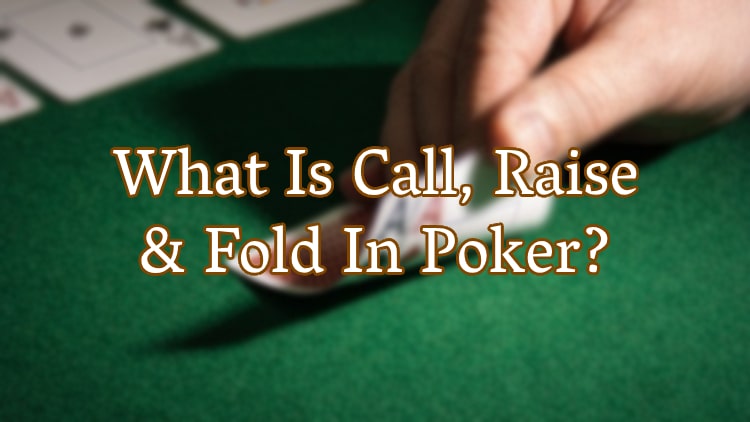
Poker is a much-loved casino game, blending skill, strategy, and chance. But if you're new to the table, some terms might sound like a foreign language.
Three key actions — call, raise, and fold — are your bread and butter in poker rounds. A "call" means you match the current bet on the table, keeping you in the game. "Raise" is when you increase the bet, upping the stakes for everyone. And "fold"? That's when you bow out of the round, deciding your cards aren't worth betting on.
This trio of decisions directs the game, creating suspense and excitement around the table. Understanding them is your first step in the thrilling world of poker, so let's dive deeper.
What Is a Call In Poker?
In poker, calling is like saying, "I'll see your bet". It's when you match the number of chips that the previous player has put on the table - i.e. meeting the current bet amount. This move keeps you in the round without raising the stakes.
When To Call In Poker
Deciding when to call often depends on the strength of your hand – the cards you're holding – and what you think your opponents have.
Good Hand, But Not Great: If you believe you have a decent chance of winning but aren't confident enough to raise, calling is a safe bet.
On a Budget: If your stack of chips is getting low, calling can be a way to stay in the game without risking too much.
Bluff Calling: Sometimes, you might call to test if another player is bluffing (pretending to have strong cards). It's a bit like calling their bluff.
Information Gathering: Early in the game, calling can be a good strategy to see how others play and what cards come up without investing too much.
Remember, calling is all about balance. It's a way to stay in the game, see how things unfold, and make your move at the right moment.
What Is a Raise In Poker?
In poker, to raise means you increase the bet currently on the table. It's not just about adding more chips; it's a statement. By raising, you're saying, "I've got a good hand here", or maybe you're bluffing, trying to convince others you do. Either way, it ups the ante and the excitement.
When To Raise In Poker
Raising in poker is strategic, and knowing when to do it can be advantageous.
Strong Hand: The most common reason to raise is if you have a strong hand. You believe you have a good chance of winning, so you want to increase the pot.
Bluff or Semi-Bluff: Sometimes, even with a not-so-great hand, you might raise to bluff, hoping others think you have them beat and fold. Semi-bluffing means you have a hand that could improve with future cards.
Taking Control: Raising can show confidence, putting you in the driver's seat of the game. It might pressure others to fold or play more cautiously.
Thin the Field: If you have a decent hand and want fewer players in the game, a raise can encourage some to fold, increasing your chance of winning.
Remember, raising is a tool. Use it wisely, considering your hand, your opponents, and your position at the table. Also, use it responsibly because it means putting more money into the game.
What Is a Fold In Poker?
In poker, to fold means to bow out of the current hand. You're essentially saying, "I'm out", for now, placing your cards face down closer to the middle of the table. Folding means you won't be contributing any more chips to the pot in this round, but it also means you won't lose any more than you've already bet.
When To Fold In Poker
Knowing when to fold is crucial. It's all about minimising losses and biding your time for a better opportunity.
Weak Hand: The most common reason to fold is simply having a hand that's unlikely to win. There's no shame in folding; it can be a strategic move.
High Bets: If the betting gets too rich for your blood, folding can save your chip stack from taking a serious hit.
Read the Room: Sometimes, the way other players are betting can signal that they have strong hands. If you don't think you can compete, folding might be wise.
Strategic Retreat: In some cases, folding can be a strategic move to mislead other players about your playing style or to save your chips for a more advantageous hand later on.
Remember, folding isn't necessarily giving up; it's playing smart. Knowing when to hold 'em and when to fold 'em is part of what makes poker so exciting. As always, it's crucial to consider your budget above everything else and ensure you are playing responsibly.
